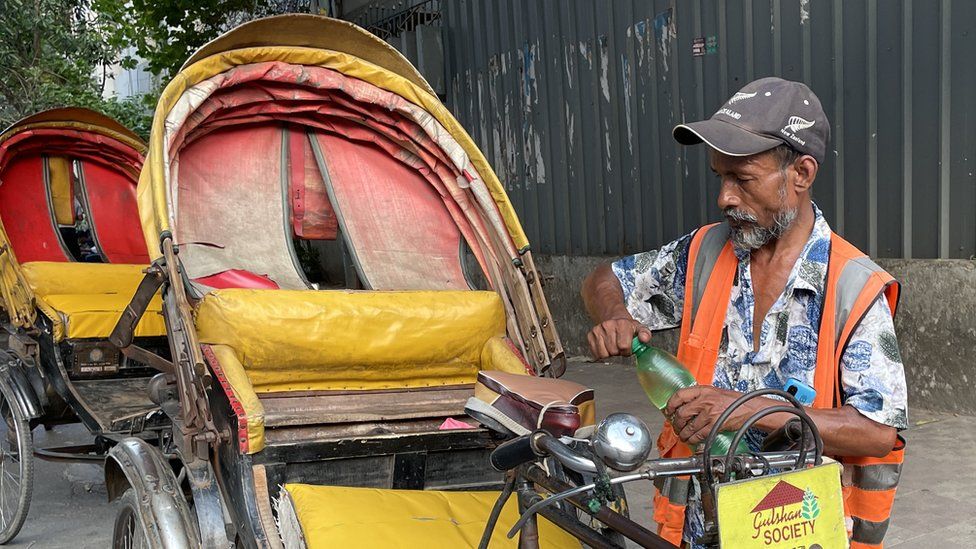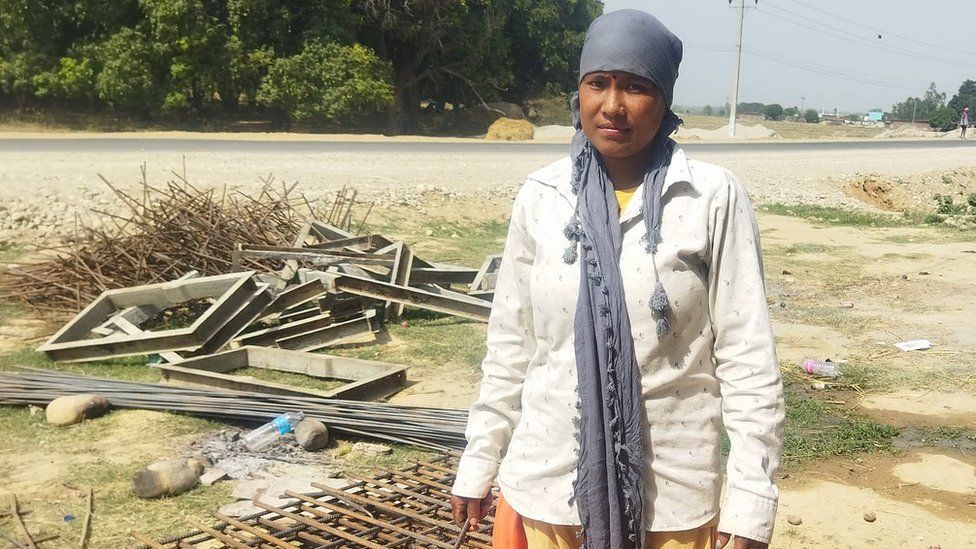Rain or shine, Mohammad Shukkur Ali, a rickshaw puller in his 50s, shows up for work on the streets of the Bangladesh capital Dhaka. The work is already punishing as it requires massive physical effort. But this year, the heat has made things even worse. Temperatures in the city hit 40.6C (105.8F) in April - a record high.
But Mr Ali, who lives with his wife and two children in a rented room, says he has no choice but to endure the discomfort.
"I need to work because we are poor," he said.
Mr Ali works eight-hour shifts every day in Gulshan, an affluent district in Dhaka which houses fancy apartments, sprawling corporate offices and several foreign embassies. To be even allowed into the area, he has to wear a jacket over his shirt - a uniform of sorts - which makes the heat even more uncomfortable.
The gruelling heat in the country has been made worse by fuel shortages- a consequence of the Ukraine war - which has led to frequent power cuts.
Millions of people across the world, including in North America and Europe, have experienced blistering heat this year.
A large number of cities have reported record temperatures, with scientists saying that July is "virtually certain" to be the world's warmest month on record.
Countries have pledged to keep the world from warming past 1.5C - a limit seen as a key threshold to prevent the worst of the impacts of climate change by reducing fossil fuel emissions. But scientists say there is a high chance that this limit will be breached in the next four years.
The globe is now about 1.1C warmer than pre-industrial times. But alarmingly, that increase has been even higher in Asia this year.
A recent report, compiled by nearly two dozen climate scientists, found that temperatures earlier this year were up by 2C in many parts of Asia, a region home to more than 4.5 billion people.
And the impact of this year's extreme heat has been felt in countries across the continent.
At least 23 people have died from heat-related injuries in between May and August, more than triple the number from the same period last year. Temperatures had risen to as high as 38C in parts of the country. On Thursday, Hundreds of participants at the 25th World Scout Jamboree in Buan, were hit by heat exhaustion. Other parts of the country witnessed heavy rainfalls and floods.
Japan issued heatstroke alerts across half of the country in mid-July after temperatures broke records in many parts of the country. The country's capital Tokyo alone saw temperatures reach a record-high of 38C (100.4F), 8C higher that an average Tokyo summer. And in just one week in July, local media reported that more than 9,000 people were hospitalised due to heatstroke across the country.
China recorded its hottest temperature, when the mercury in a dusty western Xinjiang province town surged to 52C (125F) in July. Just a month earlier, the capital Beijing recorded its hottest June day in more than 60 years at 51C (123.8F).
In India, an intense heatwave swept through the north of the country in May, with temperatures climbing to a record 49.2C (120.5F) in parts of the capital, Delhi.
South East Asia also saw record temperatures in a number of countries in both April and May - which are typically the hottest months for the region.
Heatwaves are among the deadliest natural disasters in the world, sometimes killing more people than earthquakes, typhoons, or floods. They can also melt roads, destroy infrastructure, and start forest fires. Some experts call heatwaves a silent disaster because the deaths are often not immediately obvious - they can also trigger pre-existing conditions like diabetes, which are exacerbated in the heat and increase chances of dehydration.
Extreme heat also forces the heart to work harder. Just a half degree rise in core body temperature can raise the heart rate by 10 beats per minute. Heatstroke can occur when the core body temperature rises and stays above 40C (104F), according to Mayo Clinic. It can lead to organ failure, cardiac arrest, and even death if left untreated.
Heat increases moisture in the air and "the sweat on your skin simply can't evaporate [and take the heat away] in the humidity," said Winston Chow, an associate professor of Urban Climate at Singapore Management University. "It becomes dangerous when the body loses the natural ability to cool off."
A 35C (95F) wet-bulb temperature - what scientists call the measure of heat plus humidity - is the "absolute limit" of human tolerance, according to Zach Schlader, a physiologist at Indiana University Bloomington.
Senthil Logesh, a 26-year-old Indian construction worker in Singapore, said heat shelters and water points had to be installed on site where he currently works. Temperatures in parts of the city, which is humid throughout the year, had hit 37C (98.6F) in May, matching a record set four decades ago.
The wet-bulb temperature was monitored on the site, and workers were asked to rest when it got too high. But even then, Mr Logesh, who works 10 hours almost every day of the week, said that everyone was always "wet from sweating a lot."
Over the next decades, population is expected to double in Asia, with the growth mainly in tier-two cities in countries like Thailand, Indonesia, and Vietnam, according to Prof Chow, who also co-chairs the Intergovernmental Panel on Climate Change (IPCC), the UN's top climate science agency that assesses the socio-economic impact of climate change.
"Not only will there be more construction taking place, but it will also happen in hotter conditions, so we need to start looking at reducing risks for many vulnerable people," he said.
While reducing emissions is important to prevent the world from warming further, Prof Chow said that countries also need to adapt to heatwaves, which will only increase in intensity and frequency.
Dealing with heatwaves
In South East Asia's wealthier countries like Singapore for instance, infrastructures exist to shield people from the heat, like air-conditioning in malls and homes. The country also plans to build more green spaces, covered walkways, and change building designs to offer more shelter.
However, poorer countries in the same region are unable to implement similar measures. Even when plans to tackle heat exist, they are typically underfunded and often overlook poorer communities.
Thailand, for example, has a national-level early warning system for heatwaves, asking people to find shelter or wear light-coloured clothing, according to Chaya Vaddhanaphuti, a co-author of the Asia heatwave report.
"But not everyone can do that, such as homeless people, the disabled, or the elderly. The plans need to be tailored to these groups as well," she told the BBC. "This is all assuming people actually do as they are told. These plans serve more as general recommendations than specific instructions."
One example of a low budget plan that has seen some success is one developed by the western Indian city of Ahmedabad in 2013, after experiencing a devastating heatwave that killed 1,344 people. Authorities used white paint on the tin and asbestos roofs of the homes of migrant slums to cool them. They make up a quarter of the city's households. Public parks are also kept unlocked throughout the day for street stall owners and construction workers to find shade. Other Indian cities have since tried replicating this plan.
But critics say more can be done for the poorest communities who still suffer the brunt of natural disasters like heatwaves as they often don't have the means, or access to infrastructure, to cope.
On hot summer nights in Nepal, 30-year-old Krishni Tharu falls asleep in the same room with her two children and mother-in-law, the whole family sharing a single standing fan. In the western city of Nepalgunj, where she works as a construction labourer, temperatures hit 44C (111F) in June.
Nepal, home to Mount Everest, gets warm during the main summer period from May to July. Government data also shows that the temperature has been steadily on the rise every year.
She's usually exhausted after working 10-hour days, from dawn to dusk, earning about US$4.50 each shift to support her family. Such gruelling, outdoor labour has only gotten harder in recent years as the heat has gotten worse, she said.
But she can't stop. Cutting off her family's precious income is not an option, she told the BBC. "There is no escape. I have to work."
Orchi Othondrila is a BBC Bangla reporter based in Dhaka. Bimala Chaudhary is a BBC Nepali reporter based in Kathmandu.


























.jpg)
.jpg)